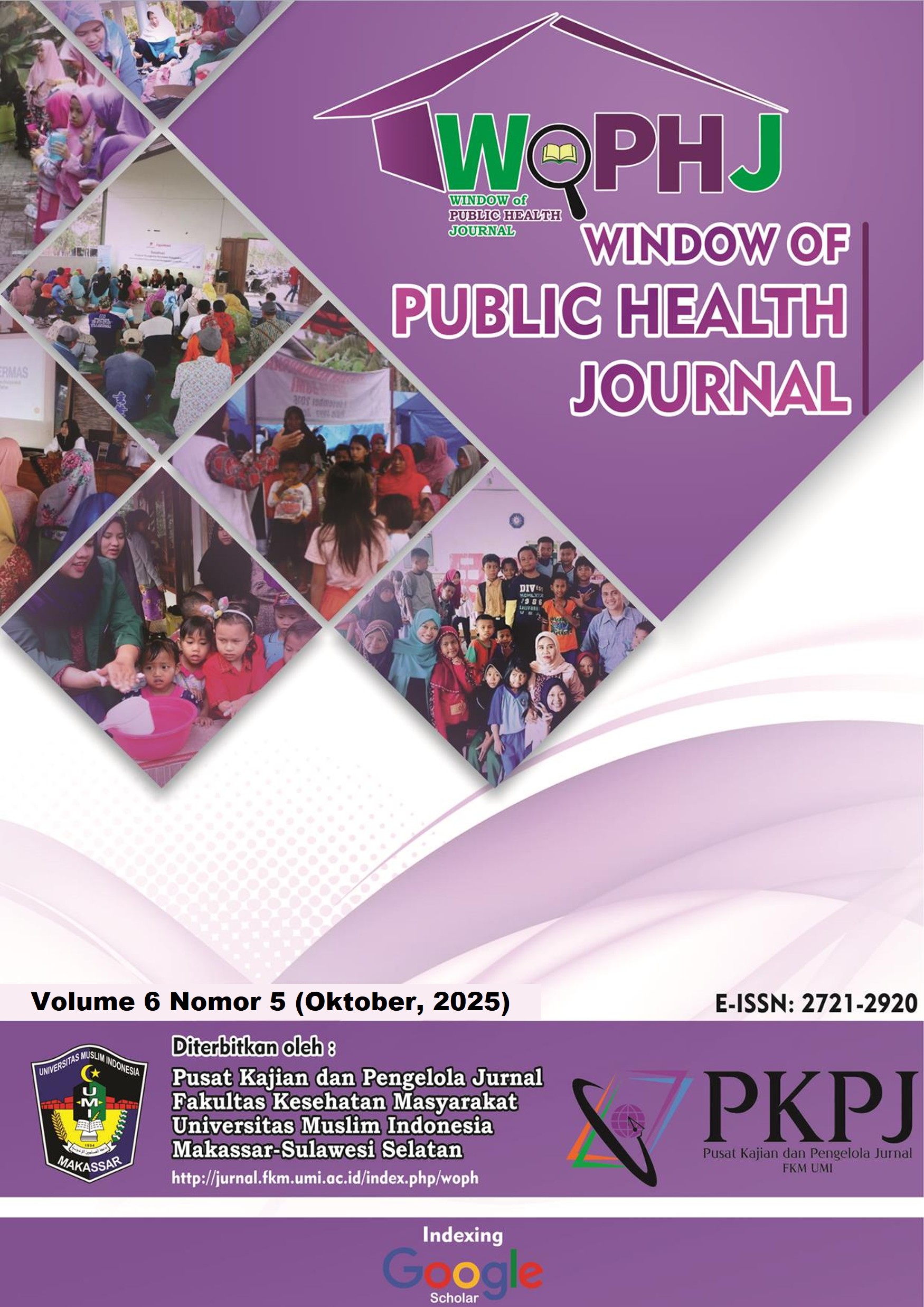Hubungan Pemberian Asi Eksklusif Dan Pengetahuan Gizi Ibu Terhadap Status Gizi Pada Balita Usia 6 – 23 Bulan Di Puskesmas Cendrawasih Kota Makassar
DOI:
https://doi.org/10.33096/z6z0z329Keywords:
Breastmilk, Nutritional status, ToddlerAbstract
Breast milk is the most important source of energy and nutrition for children aged 6-24 months. Breastfeeding is closely related to the nutritional status of infants. The purpose of this study was to determine the relationship between exclusive breastfeeding and maternal nutritional knowledge with the nutritional status of toddlers aged 6-23 months in the Cendrawasih Community Health Center, Mamajang District, Makassar City. This study was conducted in January and February 2023 at the Cendrawasih Community Health Center in Makassar City. The study population consisted of 52 mothers with children aged 6 to 23 months. Data collection was conducted through interviews, where questionnaires were distributed to respondents and processed using SPSS. The results of this study indicate a relationship between breastfeeding and the nutritional status of toddlers as many as 39 (97.5%), a relationship between maternal nutritional knowledge and the nutritional status of toddlers as many as 44 (97.8%) respondents, a relationship between family income and the nutritional status of toddlers as many as 21 (95.5%) respondents and a relationship between household food security and the nutritional status of toddlers as many as 22 (75.9%) respondents. From the results of statistical tests, it was found that there was a significant relationship between exclusive breastfeeding and maternal nutritional knowledge for toddlers aged 6-23 months, where p = 0.000 < α = 0.05. It can be concluded that there is a relationship between exclusive breastfeeding and nutritional knowledge, affecting toddlers' nutritional status, at the Cendrawasih Health Center in Makassar City. It is hoped that mothers and prospective mothers can increase their knowledge about nutrition and the importance of exclusive breastfeeding for babies.
References
1. World Health Organization (WHO). Infant and young child feeding [Internet]. 2020 [cited 2020 Aug 30]. Available from: https://www.who.int/news-room/fact-sheets/detail/infant-and-young-child-feeding
2. United Nations Children’s Fund (UNICEF). The State of the World’s Children 2019: Children, food and nutrition: Growing well in a changing world. New York: UNICEF; 2019. Available from: https://www.unicef.org/reports/state-of-worlds-children-2019
3. United Nations Children’s Fund (UNICEF). From the first hour of life: Making the case for improved infant and young child feeding everywhere. New York: UNICEF; 2019.
4. Par’i HM. Penilaian status gizi dilengkapi proses asuhan gizi terstandar. Jakarta: EGC; 2017.
5. Gibney M, Margetts B, Kearney J, Arab L. Gizi kesehatan masyarakat. Jakarta: EGC; 2017.
6. Amalia F, Yusuf RA, Patimah S. Hubungan status gizi dengan perkembangan anak usia pra-sekolah di TK Sumange Teallara. Window of Public Health Journal. 2022;3(4):799–809.
7. Purnamasari M, Rahmawati T. Hubungan pemberian ASI eksklusif dengan kejadian stunting pada balita umur 24–59 bulan. Jurnal Ilmiah Kesehatan Sandi Husada. 2021;10(1):290–9.
8. Kementerian Kesehatan Republik Indonesia. Hasil pemantauan status gizi (PSG) tahun 2017. Jakarta: Direktorat Gizi Masyarakat, Dirjen Kesehatan Masyarakat; 2018.
9. Abbas HH, Wulandari NA, Lestari A, Bur N. Hubungan riwayat pola menyusui, usia penyapihan dan emotional bonding terhadap status gizi pada balita. Window of Health: Jurnal Kesehatan. 2020;116–22.
10. Lestari RR. Faktor-faktor yang berhubungan dengan pemberian ASI eksklusif pada ibu. Jurnal Obsesi: Jurnal Pendidikan Anak Usia Dini. 2018;2(1):130. doi:10.31004/obsesi.v2i1.17.
11. Apriyanti SM. Hubungan tingkat pengetahuan ibu tentang gizi balita dengan status gizi balita di Desa Jelat Kecamatan Baregbeg Tahun 2020. Jurnal Ilmiah Kesehatan. 2020.
12. Najibah NA, Rouli, Nababan. Akhir masa menyusui. Jakarta: Gramedia Pustaka Utama; 2017.
13. Kasumayanti E, Zurrahmi ZR. Hubungan pendapatan keluarga dengan status gizi balita di Desa Tambang wilayah kerja Puskesmas Tambang Kabupaten Kampar tahun 2019. Jurnal Ners. 2020;4(1):7–12.
14.Septiyanti S, Seniwati S. Nutrition Status and Psychosocial Stimulation with the Development of Infants Aged 6-12 Months. J Ilm Kesehat. 2025;7(1):23–34.
15. Afrizal A, Sudargo T, Subejo. Hubungan ketahanan pangan keluarga dengan status gizi balita (studi di Desa Palasari dan Puskesmas Kecamatan Legok, Kabupaten Tangerang). Jurnal Ketahanan Nasional. 2017;23(3). Available from: http://jurnal.ugm.ac.id/jkn
Downloads
Published
Issue
Section
License
Copyright (c) 2025 A. Fira Fratiwi, Haeruddin, Nurmiati Muchlis

This work is licensed under a Creative Commons Attribution-NonCommercial-ShareAlike 4.0 International License.







